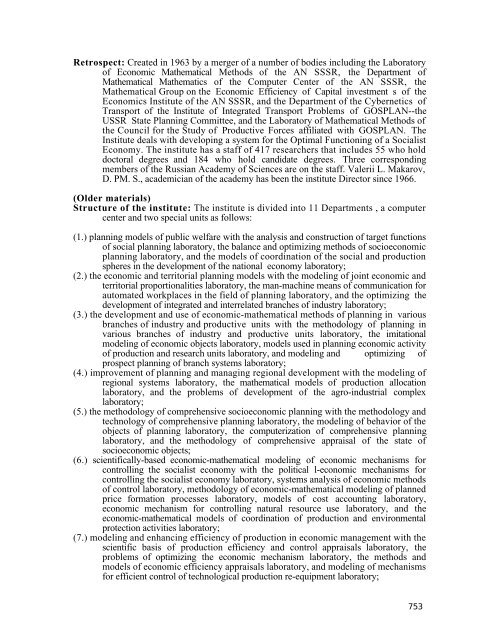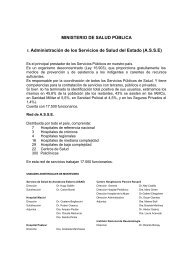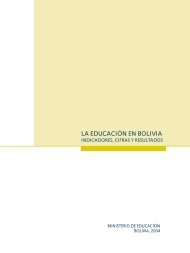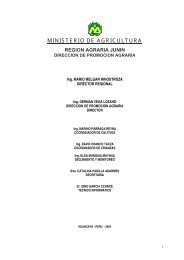- Page 1 and 2:
A Guide to the Russian Academy of S
- Page 3 and 4:
Preface There are a number of peopl
- Page 5 and 6:
In closing this preface, I remind m
- Page 7 and 8:
select and supports (via the system
- Page 9 and 10:
Early Growth: In 1928, the academy
- Page 11 and 12:
Section of Physical Technical and M
- Page 13 and 14:
scientific research centers, the ge
- Page 15 and 16:
350 300 250 200 150 100 50 0 Subuni
- Page 17 and 18:
No. of Scientists 900 800 700 600 5
- Page 19 and 20:
25 20 15 10 5 0 Figure 8 Growth and
- Page 21 and 22:
Scientific Research Institutes in R
- Page 23 and 24:
The Scientific Nomenklatura: Withou
- Page 25 and 26:
❖❖❖ Linkage with Former Minis
- Page 27 and 28:
The N. E. Zhukovskii Aerohydrodynam
- Page 29 and 30:
physics. He was Director of that in
- Page 31 and 32:
Osip’ian, (Osipian) Iurii A., D.
- Page 33 and 34:
Alferov, Zhores I., D. PM. S. Born
- Page 35 and 36:
conducts research on mathematical g
- Page 37 and 38:
of the Caucasus Power Engineering C
- Page 39 and 40:
eceived official status as an insti
- Page 41 and 42:
departments, one laboratory, and a
- Page 43 and 44:
departments are known. In 1991, of
- Page 45 and 46:
interactions of the ocean. It is su
- Page 47 and 48:
former republic academies, however,
- Page 49 and 50:
groups such as the Yang-Mills field
- Page 51 and 52:
Academician Evgeny (Evgenii) (Evgen
- Page 53 and 54:
the Siberian Department. Winner--wi
- Page 55 and 56:
Krilov Prize in 1972. Recipient of
- Page 57 and 58:
Sciences Department. He has been a
- Page 59 and 60:
Physical and Mathematical Sciences
- Page 61 and 62:
committees: The National Committee
- Page 63 and 64:
mathematical community and introduc
- Page 65 and 66:
Kudryavtsev, E. F. Mishchenko, S. M
- Page 67 and 68:
3. Department of Algebra: The Depar
- Page 69 and 70:
The results obtained at the Departm
- Page 71 and 72:
Gushchin, A. A. Dezin, V. N. Maslen
- Page 73 and 74:
problems of gravitation theory are
- Page 75 and 76:
Kolmogorov); 2. Asymptotic methods
- Page 77 and 78:
Among the main activities of the De
- Page 79 and 80:
Upper and lower estimates of comple
- Page 81 and 82:
7. Laboratory of Mathematical Probl
- Page 83 and 84:
engineering methods of solution of
- Page 85 and 86:
The institute is located at 112 Che
- Page 87 and 88:
No. of Persons 40 35 30 25 20 15 10
- Page 89 and 90:
Mathematics Institutes Within the A
- Page 91 and 92:
member of the Ukrainian Academy, an
- Page 93 and 94:
Acting Deputy of Academician-secret
- Page 95 and 96:
Pokrovskii, Yarolslav Ie., D. PM. S
- Page 97 and 98:
1955 he served as Vice President of
- Page 99 and 100:
University in 1952. He was made a p
- Page 101 and 102:
Scientific Council on the Complex P
- Page 103 and 104:
Inorganic Materials Department. He
- Page 105 and 106:
Astronomy Department of the Academy
- Page 107 and 108:
Talanov, Vladimir I., D. PM. S. Bor
- Page 109 and 110:
Physics Laboratory of the A. F. Iof
- Page 111 and 112:
Gaponov, S. V., D. PM. S. Russian P
- Page 113 and 114:
He holds the chair of General Physi
- Page 115 and 116:
Stishov, Sergei M., D. PM. S. Corre
- Page 117 and 118:
Period of Greatest Growth: The peri
- Page 119 and 120:
Development of the AMS RICH detecto
- Page 121 and 122:
Neutrons in the Earth's Atmosphere.
- Page 123 and 124:
High-power RF-generation (person in
- Page 125 and 126:
Laser technologies; Laser ranging o
- Page 127 and 128:
Head Prof. R. Ambartsumian Laser Ra
- Page 129 and 130:
Head Professor I. Zubarev (Staff 27
- Page 131 and 132:
email: yakimenk@sci.lpi.ac.ru Inves
- Page 133 and 134:
Scientific staff Beloborodov Andrei
- Page 135 and 136:
Laboratory of Space IR-Spectrometry
- Page 137 and 138:
Position Director ASC, Professor of
- Page 139 and 140:
5. Astro Space Center of P. N. Lebe
- Page 141 and 142:
❖❖❖ 7. Troitsk Institute of I
- Page 143 and 144:
Space Geodesy Department of INASAN
- Page 145 and 146:
INTRODUCTION TO CLASSICAL GRAVITY P
- Page 147 and 148:
Nikolai N. Samus (variable stars, g
- Page 149 and 150:
Located at 65, Building 1, Pulkovsk
- Page 151 and 152:
ate, on the creation of highly stab
- Page 153 and 154:
Division Officers Director: Zhores
- Page 155 and 156:
Staff: 266 researches including 61
- Page 157 and 158:
Celestial Mechanics Department: Sen
- Page 159 and 160:
Ionosphere Laboratory: Chief Lobach
- Page 161 and 162:
Technology. Structure and Scientifi
- Page 163 and 164:
of weak radiation in the visible sp
- Page 165 and 166:
Nabokin, P., since '70; Shavrov, V.
- Page 167 and 168:
❖❖❖ 22. Radio Physics Scienti
- Page 169 and 170:
24. High Temperature Institute--now
- Page 171 and 172:
The Institute of Solid State Physic
- Page 173 and 174:
magnetometers, and quartz magnetome
- Page 175 and 176:
the SPICE information system--a mea
- Page 177 and 178:
performance of the Prognoz-8 and In
- Page 179 and 180:
+7(095) 333-20-45 FAX Number +7(095
- Page 181 and 182:
Email : postmaster@fcgs.msk.su phon
- Page 183 and 184:
General Image processing project ma
- Page 185 and 186:
in a word, roughly 99% of matter in
- Page 187 and 188:
The SSDA includes also information
- Page 189 and 190:
Located at 8 Zdanovskaia (aya) st.,
- Page 191 and 192:
processes, relativistic objects, bi
- Page 193 and 194:
staff of 14 persons that includes t
- Page 195 and 196:
S., since '83; Osiko, Viacheslav V.
- Page 197 and 198:
Note: After much reflection, I have
- Page 199 and 200:
Lenin prize winners; 165 are State
- Page 201 and 202:
The VVER Division of Institute of N
- Page 203 and 204:
Conduction of fundamental, research
- Page 205 and 206:
In 1975, a large T-10 fusion device
- Page 207 and 208:
these studies are planned to be ext
- Page 209 and 210:
working out of the physical princip
- Page 211 and 212:
Engineering productive complex (Dir
- Page 213 and 214:
The trend of theoretical and experi
- Page 215 and 216:
The first Russian Nuclear Plant Sta
- Page 217 and 218:
1956 The creation of the largest in
- Page 219 and 220:
Demyan Mikhaylovich Ovechkin (1912-
- Page 221 and 222:
9. Center of Nonlinear Research att
- Page 223 and 224:
for telegrams: Niznii Arhyiz, Stavr
- Page 225 and 226:
Method of Listing Other Research In
- Page 227 and 228:
Directors or associate Directors of
- Page 229 and 230:
Corresponding Member Venedikt P. Dz
- Page 231 and 232:
Academician Viktor A. Matveev, tel.
- Page 233 and 234:
Originally elected to the Physical
- Page 235 and 236:
51, he worked on problems in thermo
- Page 237 and 238:
Dikanskii, Nikolai S. D. PM. S. Bor
- Page 239 and 240:
techniques. Corresponding member th
- Page 241 and 242:
Accelerator Laboratory of the B. P.
- Page 243 and 244:
Beguchev O. P. (Oleg Petrovich) b.
- Page 245 and 246:
Dmitriev S. P. (Stal' Pavlovich) b.
- Page 247 and 248:
Golutvin I. A. (Igor Anatol'yevich)
- Page 249 and 250:
Klimenko S. V. (Stanislav Vladimiro
- Page 251 and 252:
Kuznetsov I. A. (Igor' Alekseyevich
- Page 253 and 254:
Moiseev A. M. (Artemiy Mikhaylovich
- Page 255 and 256:
Pirozhenko V. M. (Vitaly Mikhaylovi
- Page 257 and 258:
Ryskin M. G. (Mikhail Grigor'yevich
- Page 259 and 260:
Skrinsky A. N. (Alexandr Nikolayevi
- Page 261 and 262:
Tyul'pakov V. N. (Viktor Nikolayevi
- Page 263 and 264:
Zhilyaev A. S. (Aleksandr Stepanovi
- Page 265 and 266:
Main Achievements The principal res
- Page 267 and 268:
Neutron Interferometry Group Head:
- Page 269 and 270:
High Energy Physics Division Direct
- Page 271 and 272:
Technology), three technical divisi
- Page 273 and 274:
Chairman: Academician Spartak T. Be
- Page 275 and 276:
16 14 12 10 8 6 4 2 0 Personnel in
- Page 277 and 278:
Scientist of the Soviet Union. He w
- Page 279 and 280:
Academician Alexandr (Aleksandr) Ef
- Page 281 and 282:
July 1986. Academician of that depa
- Page 283 and 284:
Koval’chuk, (Kovalchuk) Boris M.,
- Page 285 and 286:
construction and operation of the w
- Page 287 and 288:
properties of matter at high temper
- Page 289 and 290:
Energetics Institute of the Siberia
- Page 291 and 292:
thermophysical and electrophysical
- Page 293 and 294:
MHD Materials Department: Chief Vir
- Page 295 and 296:
The electrification of the former S
- Page 297 and 298:
Membership Considerations: In size
- Page 299 and 300:
Academician Konstantin S. Kolesniko
- Page 301 and 302:
doctorate in physical and mathemati
- Page 303 and 304:
associated with a number of other r
- Page 305 and 306:
Ishlinskii, Aleksandr Iurii D. PM.
- Page 307 and 308:
Nonlinear Systems." His works are i
- Page 309 and 310:
Machine Building and Control System
- Page 311 and 312:
Russian Academy of Sciences in 1993
- Page 313 and 314:
and taught at the Moscow Institute
- Page 315 and 316:
Control Systems Department of the A
- Page 317 and 318:
Protasov, Viktor D. Corresponding m
- Page 319 and 320:
❖❖❖ 2. Control Problems Insti
- Page 321 and 322:
of Machine Building, Mechanics, and
- Page 323 and 324:
8. Institute of Control Problems (I
- Page 325 and 326:
(1997 update) Department of Informa
- Page 327 and 328:
Belotserkovskii, Oleg M., D. PM. S.
- Page 329 and 330:
Moscow that was established in 1948
- Page 331 and 332:
Academician Nikita N. Moiseev, tel.
- Page 333 and 334:
Kurdiumov, Sergei P., D. PM. S. Cor
- Page 335 and 336:
speed computers. His works have inc
- Page 337 and 338:
department since 1987. He was named
- Page 339 and 340:
member Information Sciences, Comput
- Page 341 and 342:
Automation Department of the academ
- Page 343 and 344:
is a member of the Bureau Governing
- Page 345 and 346:
Komsomol Central Committee prize fo
- Page 347 and 348:
The Department of Continuum Mechani
- Page 349 and 350:
Fuzzy logics for expert systems The
- Page 351 and 352:
Theoretical Problems Department: (u
- Page 353 and 354:
systems and networks, 3. LAN and IN
- Page 355 and 356:
methods for calculation of liquid o
- Page 357 and 358:
some 400, of whom 250 were professi
- Page 359 and 360:
investigate the feasibility of unif
- Page 361 and 362:
The Information Transmission and Pr
- Page 363 and 364:
SSSR and the RAN since 1984. Member
- Page 365 and 366:
Thermodynamic approach to economic
- Page 367 and 368:
Manufacturing Group "Kibernetika",
- Page 369 and 370:
Research Center for Information Sys
- Page 371 and 372:
een Chief of the Scientific Instrum
- Page 373 and 374:
fax: (095) 250-89-28; (7-095) 292-6
- Page 375 and 376:
Tbilisi. 6. Electronics and Compute
- Page 377 and 378:
No. of Persons 80 70 60 50 40 30 20
- Page 379 and 380:
however, their average age is 82.7
- Page 381 and 382:
Buchachenko, Anatolii L., D. Chem.
- Page 383 and 384:
Tolstikov, Genrikh A., D. Chem S. B
- Page 385 and 386:
processes in these electrolytes--an
- Page 387 and 388:
degrees centigrade and pressure dro
- Page 389 and 390:
Moscow State University--a V. A. Ka
- Page 391 and 392:
Polytechnical Institute. He has gui
- Page 393 and 394:
Chemical Sciences department. He gr
- Page 395 and 396:
professor at the Novosibirsk State
- Page 397 and 398:
esearchers that includes 62 doctors
- Page 399 and 400:
(45.) the Radioactive Analysis of M
- Page 401 and 402:
❖❖❖ 3. A. V. Topchiev Petroch
- Page 403 and 404:
1960s plasma chemistry--a new field
- Page 405 and 406:
Aliphatic Compounds Laboratory unde
- Page 407 and 408:
natural compounds; the search for a
- Page 409 and 410:
The CACR In 1991 the Computer Assis
- Page 411 and 412:
Damping polymer optically transpare
- Page 413 and 414:
was the recipient of the A. N. Nesm
- Page 415 and 416:
The laboratory was founded in 1989.
- Page 417 and 418:
Head of laboratory-- Dr. Gennadii G
- Page 419 and 420:
The team was set up in 1994. Synthe
- Page 421 and 422:
Laboratory for Filled Polymer Syste
- Page 423 and 424:
The team was founded in 1989. The s
- Page 425 and 426:
etc.) for scientific, industrial an
- Page 427 and 428:
of the institute where studies are
- Page 429 and 430:
Polymer Systems Electrochemistry La
- Page 431 and 432:
stable isotopes and the preparation
- Page 433 and 434:
The Insatiate is located in a small
- Page 435 and 436:
sytschev@ism.ac.ru Trofimov A. I. t
- Page 437 and 438:
The Gas Dynamics Laboratory of the
- Page 439 and 440:
arylazides; Photoinitiators of poly
- Page 441 and 442:
Webmaster: A. I. Prokhorov, Databas
- Page 443 and 444:
11. Institute of Electrochemistry n
- Page 445 and 446:
Personnel of the Top Three SRIs of
- Page 447 and 448:
cybernetics of chemical engineering
- Page 449 and 450:
work on the development of pure sub
- Page 451 and 452:
Corresponding Member Vladimir T. Ka
- Page 453 and 454:
cybernetics of chemical engineering
- Page 455 and 456:
the Communist Party of the Soviet U
- Page 457 and 458:
the Chemistry Department of Moscow
- Page 459 and 460:
Moscow which is subordinate to the
- Page 461 and 462:
Chemistry and Technology of Inorgan
- Page 463 and 464:
Established in 1964. The institute
- Page 465 and 466:
2) The Physical Chemistry of Liquid
- Page 467 and 468:
tel.37-85-13, tel.37-05-86(Iv.) 6.
- Page 469 and 470:
Department of Physical and Chemical
- Page 471 and 472:
Administrative responsibilities: Of
- Page 473 and 474:
Academician Vadim T. Ivanov, tel.33
- Page 475 and 476:
diagnostical test systems for viral
- Page 477 and 478:
of the Phosphor-organic Chemistry L
- Page 479 and 480:
Nikolskii, Nikolai N., D. Bio. S. A
- Page 481 and 482:
Physiologically Active Compounds De
- Page 483 and 484:
iopolymers via the microbial celenv
- Page 485 and 486:
esearch unit which became the Labor
- Page 487 and 488:
Research Institutes Subordinate to
- Page 489 and 490:
interdisciplinary and its scientist
- Page 491 and 492:
3. A. N. Bakh Biochemistry Institut
- Page 493 and 494:
The Ionic Channels in Cell Membrane
- Page 495 and 496:
The Cytology of Unicellular Organis
- Page 497 and 498:
Mail address: Shemyakin-Ovchinnikov
- Page 499 and 500:
It took the lead in coordinating th
- Page 501 and 502:
month-long working visits which res
- Page 503 and 504:
five genes were isolated. Sequencin
- Page 505 and 506:
in vitro the eRF1 activity increasi
- Page 507 and 508:
Experimental evidences for formatio
- Page 509 and 510:
stability compared to the "homologo
- Page 511 and 512:
domains. The existence of such defe
- Page 513 and 514:
Antibody engineering The work on th
- Page 515 and 516:
Head Yurii V. Morozov, Ph.D., D.Sc.
- Page 517 and 518:
compact chromomere-like chromatin b
- Page 519 and 520:
1997 update: ANALYTICAL CHEMISTRY O
- Page 521 and 522:
poly[d(A-T)].poly[d(A-T)], only the
- Page 523 and 524:
In 1995 studies in the Cell Prolife
- Page 525 and 526:
cells with intracellular staining o
- Page 527 and 528:
In 1995 the group continued studies
- Page 529 and 530:
Located in Puschino in the Moscow r
- Page 531 and 532:
Kulaev, Igor S., D. Bio. S., Born i
- Page 533 and 534:
Department of Physico-chemical and
- Page 535 and 536:
(Institute of Biochemistry and Phys
- Page 537 and 538:
The Laboratory of Nucleoprotein Phy
- Page 539 and 540:
Professor Vladimir A. MAKAROV Labor
- Page 541 and 542:
(5.) The Structural Methods Laborat
- Page 543 and 544:
The department also has five resear
- Page 545 and 546:
pathologies; 7) the Organic Synthes
- Page 547 and 548:
Debabov, Vladimir G., Born in 1935.
- Page 549 and 550:
Directed by Academician Mihail V. I
- Page 551 and 552:
9. R. E. Kavetskii Problems of Onco
- Page 553 and 554:
Members of the General Biology Depa
- Page 555 and 556:
Andreev, Lev. N., C. Bio. S. Born i
- Page 557 and 558:
Khrushchov, Nikolai G., D. Bio. S.
- Page 559 and 560:
Sciences. His works are in the gene
- Page 561 and 562:
Technological, and Biological Scien
- Page 563 and 564:
1. V. L. Komarov Botany Institute i
- Page 565 and 566:
Yaroslav I. Starobogatov, D. Bio. S
- Page 567 and 568:
The Paleontological Institute is a
- Page 569 and 570:
Located at 4 Botanicheskaia (aya) s
- Page 571 and 572:
Retrospect: Established in 1967 rep
- Page 573 and 574:
❖❖❖ 11. Forest Science Instit
- Page 575 and 576:
Ekaterinburg (Sverdlovsk). 20. Fore
- Page 577 and 578:
Physiology Department Members, by D
- Page 579 and 580:
Physics, and Theoretical Medicine D
- Page 581 and 582:
eplaced by Professor Simonov. He ha
- Page 583 and 584:
functioning of living beings, stres
- Page 585 and 586:
Emotions Laboratory of that Institu
- Page 587 and 588:
Institutions and Organizations of t
- Page 589 and 590:
The Earth Sciences section of the a
- Page 591 and 592:
No. of Persons 90 80 70 60 50 40 30
- Page 593 and 594:
Geophysics of the Russian Academy o
- Page 595 and 596:
Academician Vladimir Is. Keilis-Bor
- Page 597 and 598:
Academician Iurii M. Pushiarovskii,
- Page 599 and 600:
he has been on the Presidium of the
- Page 601 and 602:
graduated from the Institute of Wat
- Page 603 and 604:
Koroteev, Viktor A., C. GM. S. Corr
- Page 605 and 606:
Puzyrev, Nikolai N., D. GM. S. Born
- Page 607 and 608:
Obruchev Prize in geology for his l
- Page 609 and 610:
1987; academician in 1993. Since 19
- Page 611 and 612:
Glebovitskii, V. A. Corresponding m
- Page 613 and 614:
Academy since 1990. He is the autho
- Page 615 and 616:
at the Irkutsk State University whe
- Page 617 and 618:
Leonov, Iurii G. Corresponding memb
- Page 619 and 620:
the Cosmochemistry Laboratory, esta
- Page 621 and 622:
the Radiochemistry Laboratory, foun
- Page 623 and 624:
(update) Geology of Ore Deposits, P
- Page 625 and 626:
3) The Earth's Crust Stress State L
- Page 627 and 628:
Continents and Oceans Tectonosphere
- Page 629 and 630:
Located at 65 Leninskii ave. Moscow
- Page 631 and 632:
Stable Isotope Geochemistry Group (
- Page 633 and 634:
Thermodynamics Galina W. Physical R
- Page 635 and 636:
Andrei G. Physical Research Kalinic
- Page 637 and 638:
Igor M. Romanen koigor@iem.ac.ru Gr
- Page 639 and 640:
in Moscow which was established in
- Page 641 and 642:
Rundkvist, Dmitrii V., D. GM. S. Bo
- Page 643 and 644:
All-Russian Scientific Research Geo
- Page 645 and 646:
Mironenko, Valerii A. Corresponding
- Page 647 and 648:
10, B.Gruzinskaia st., D-242, Mosco
- Page 649 and 650:
15, Veresaieva st., Moscow, 121357,
- Page 651 and 652:
Before 1950 1. V. I. Lenin Ilmenski
- Page 653 and 654:
Department of Ocean Research, Atmos
- Page 655 and 656:
were in their 90s and one in his 80
- Page 657 and 658:
since 1953. From 1954 to 1964, he w
- Page 659 and 660:
Kondrat’ev, Kirill Ia., D. PM. S.
- Page 661 and 662:
Corresponding Member Grigorii V. Vo
- Page 663 and 664:
history of the cosmos. Correspondin
- Page 665 and 666:
Vasil’ev, Oleg F., D. Tech. S. Bo
- Page 667 and 668:
Kabanov, Mikhail V., D. PM. S. Born
- Page 669 and 670:
While researching the development o
- Page 671 and 672:
moved to Moscow in 1934. In 1936, i
- Page 673 and 674:
Optics Laboratory; Applied Hydro-op
- Page 675 and 676:
1990 for work on “Basic Regularit
- Page 677 and 678:
meters, temperature measurement the
- Page 679 and 680:
3, Puizevskii st., Moscow, 109017,
- Page 681 and 682:
The Social sciences "section" of th
- Page 683 and 684:
enough about the educational backgr
- Page 685 and 686:
academician since December 1989. He
- Page 687 and 688:
Scientist Secretary: Prof. Viachesl
- Page 689 and 690:
1952. From 1964 to 1965, he worked
- Page 691 and 692:
Yanin, Valentin L. Born in 1929 in
- Page 693 and 694:
holding the chair of history at the
- Page 695 and 696:
esearchers of whom 34 hold the doct
- Page 697 and 698:
(aya)’s collection of V. I. Verna
- Page 699 and 700:
candidate degrees. Research priorit
- Page 701 and 702: The institute branch has some 100 r
- Page 703 and 704: Institute personnel are at work wit
- Page 705 and 706: (4.) the history of the constructio
- Page 707 and 708: ❖❖❖ 13. State Historical Libr
- Page 709 and 710: (Scientific-systematic direction is
- Page 711 and 712: Membership of the Philosophy and La
- Page 713 and 714: Dmitriev, Anatolii V., D. Phil. S.
- Page 715 and 716: group on social movements; (2.) the
- Page 717 and 718: graduated from the Novosibirsk Inst
- Page 719 and 720: Institute imeni Dorzhi Banzarova wh
- Page 721 and 722: 2. Philosophy Institute in Moscow.
- Page 723 and 724: (3.) the comprehensive study of the
- Page 725 and 726: (3.) the group on rural family prob
- Page 727 and 728: E-mail: postmaster@ipras.msk.su tel
- Page 729 and 730: 9. LABORATORY OF NONVERBAL COMMUNIC
- Page 731 and 732: CONSULTING CENTER E-mail: postmaste
- Page 733 and 734: (Older materials) Established in 19
- Page 735 and 736: elations under G. I. Bondarevskii,
- Page 737 and 738: Technical Supply Department; 13. Th
- Page 739 and 740: Polytechnic Institute. The results
- Page 741 and 742: of the function of science in the n
- Page 743 and 744: an aspirant, a junior and senior re
- Page 745 and 746: Geographic Union will be its founde
- Page 747 and 748: Development Laboratory; Problems of
- Page 749 and 750: the Deputy Directors of the Economi
- Page 751: ways of providing total and efficie
- Page 755 and 756: (See: A Scholars’ Guide. . .)(See
- Page 757 and 758: efficiency evaluation for financial
- Page 759 and 760: 200 researchers, there are 20 state
- Page 761 and 762: Forecasting Financial Resources For
- Page 763 and 764: using the resource and technical po
- Page 765 and 766: estructuring of insolvent enterpris
- Page 767 and 768: fellows receive a stipend. Students
- Page 769 and 770: (4.) the international and politica
- Page 771 and 772: 1. Theory and practice of China's s
- Page 773 and 774: Located at 44 Build 2. Vavilova st.
- Page 775 and 776: laboratory; regional problems of so
- Page 777 and 778: Retrospect: This institute was esta
- Page 779 and 780: 2. National Economy Prediction Inst
- Page 781 and 782: earliest known founding dates. It i
- Page 783 and 784: eceived those degrees is known in o
- Page 785 and 786: Timofeev, Timur T., D. Hist S. Born
- Page 787 and 788: Affairs, the International Institut
- Page 789 and 790: oriental museum (Kunstkamera) was t
- Page 791 and 792: the Near East; Ancient East; Far Ea
- Page 793 and 794: institute employs 209 scholars of w
- Page 795 and 796: and of the social composition of th
- Page 797 and 798: There are a number of independent l
- Page 799 and 800: tel.290-09-56, fax: 202-07-86 Direc
- Page 801 and 802: Department of Literature and Langua
- Page 803 and 804:
Nikolaev, Petr A., D. Phlg S. Corre
- Page 805 and 806:
Stepanov, Iurii S., D. Phlg. S. Bor
- Page 807 and 808:
Academy since 1981. Since 1985, aca
- Page 809 and 810:
Russian literature, foreign literat
- Page 811 and 812:
Retrospect: Although established in
- Page 813 and 814:
Directed by Corresponding member Fe
- Page 815 and 816:
1. O. O. Potebni Linguistics Instit
- Page 817 and 818:
( 1996 update) Chernogolovka Scient
- Page 819 and 820:
Chernogolovka, a small, cozy, pictu
- Page 821 and 822:
The Landau Institute for Theoretica
- Page 823 and 824:
Gas Dynamics Laboratory Professor V
- Page 825 and 826:
Iurii V. Alekhin, D. Sc., Head of l
- Page 827 and 828:
computers have complete network cap
- Page 829 and 830:
planned to build production premise
- Page 831 and 832:
4. THE INSTITUTE OF STRUCTURAL MACR
- Page 833 and 834:
temperature superconductivity of di
- Page 835 and 836:
part of the Landau School. The majo
- Page 837 and 838:
Ethnology under K. V. Pavlovne, C.
- Page 839 and 840:
Zaytsevim, C. Tech. S. in 1959, was
- Page 841 and 842:
1959; K. F. Faseev, 1961-1963; M. K
- Page 843 and 844:
expanded and renamed the Scientific
- Page 845 and 846:
Kola Scientific Center ❖❖❖ (1
- Page 847 and 848:
than 300 workers including 3 profes
- Page 849 and 850:
Nikolai M. Belkovskii, D. Bio. S.,
- Page 851 and 852:
Radio Weather Forecasting Bureau: H
- Page 853 and 854:
elaboration of scientific foundatio
- Page 855 and 856:
1. detecting a state spruce forests
- Page 857 and 858:
Inorganic materials, 1982, vol.18,
- Page 859 and 860:
Novgorod, Murmansk and Pskov Oblast
- Page 861 and 862:
Akademgorodok--a main streeet The S
- Page 863 and 864:
In 1989, the Siberian Branch, by th
- Page 865 and 866:
Department status in the mid-1980s,
- Page 867 and 868:
70 60 50 40 30 20 10 0 1968 1969 19
- Page 869 and 870:
The LIH was the first institute fou
- Page 871 and 872:
United Institute of Geology, Geophy
- Page 873 and 874:
Institute of Petroleum Chemistry Un
- Page 875 and 876:
The institutions and organization p
- Page 877 and 878:
working out new methods of waste-fr
- Page 879 and 880:
Institute of Thermal Physics, Insti
- Page 881 and 882:
graduate students much greater that
- Page 883 and 884:
Chairman: served or are serving as
- Page 885 and 886:
Presidium Headquarters in Akademgor
- Page 887 and 888:
since 1963, holding the chair of So
- Page 889 and 890:
hydrodynamics, computational mathem
- Page 891 and 892:
membership in the Biochemistry, Bio
- Page 893 and 894:
Corresponding member of the Geology
- Page 895 and 896:
candidate degree. He is on the nati
- Page 897 and 898:
Fusion,” “Plasma Physics and Co
- Page 899 and 900:
esearch of 15 aspirants for the can
- Page 901 and 902:
Sciences and of the Siberian Depart
- Page 903 and 904:
Optics Institute was established in
- Page 905 and 906:
speed modeling. Under his leadershi
- Page 907 and 908:
Siberian Department’s Scientific
- Page 909 and 910:
Leonov, Sergei B., D. Tech. S. Born
- Page 911 and 912:
Head of the sector of that institut
- Page 913 and 914:
Physics in Novosibirsk. He has taug
- Page 915 and 916:
In 1991, a new International resear
- Page 917 and 918:
Novosibirsk State University where
- Page 919 and 920:
the Theory Laboratory of the Budker
- Page 921 and 922:
graduated from Moscow State Univers
- Page 923 and 924:
Laventriev Avenue--a street of scie
- Page 925 and 926:
(1997 update) The Institute of Auto
- Page 927 and 928:
Sergey Rautian, Corr.-memb. of RAS
- Page 929 and 930:
The Technical Construction Institut
- Page 931 and 932:
Siberian Branch in 1988. From 1967
- Page 933 and 934:
The Computing Center consists of 11
- Page 935 and 936:
(4.) the Laboratory for the Optimiz
- Page 937 and 938:
are: V. E. Kotov, Full Professor an
- Page 939 and 940:
❖❖❖ 7. Technological Construc
- Page 941 and 942:
(5.) the X-ray and Molecular Spectr
- Page 943 and 944:
asis for discovering the mechanism
- Page 945 and 946:
chemistry, the structural conversio
- Page 947 and 948:
Bagayev Sergei Nikolaevich Phone: +
- Page 949 and 950:
The original Institute was founded
- Page 951 and 952:
professor Vasilevsky Ruslan Sergeev
- Page 953 and 954:
Boyko, Vladimir I., D. Econ. S. Bor
- Page 955 and 956:
eactors and processes, development
- Page 957 and 958:
materials, for oil refining technol
- Page 959 and 960:
The research interests of Vladimir
- Page 961 and 962:
general theory of catalysts prepara
- Page 963 and 964:
the direct catalytic oxidation of h
- Page 965 and 966:
program "Catalysis by HPA and Relat
- Page 967 and 968:
generation (they serve as key mater
- Page 969 and 970:
Head of the Laboratory of Catalytic
- Page 971 and 972:
His research activities concern par
- Page 973 and 974:
complex of kinetic methods includin
- Page 975 and 976:
electronic structure and reactivity
- Page 977 and 978:
employs some 900 persons of whom mo
- Page 979 and 980:
in 1968--interested in solid state
- Page 981 and 982:
3) The Cationoid Reactions Laborato
- Page 983 and 984:
Corresponding member of the USSR Ac
- Page 985 and 986:
Mach Reflection in Steady Flows; Sh
- Page 987 and 988:
Head of the Laboratory - Professor
- Page 989 and 990:
str. Institutskaya 4/1 Novosibirsk
- Page 991 and 992:
The International Center of Aerophy
- Page 993 and 994:
Physics of Low Temperature Plasmas
- Page 995 and 996:
from 1977 to 1988. He is an honored
- Page 997 and 998:
een a professor since 1979, holding
- Page 999 and 1000:
The Institute publishes every year
- Page 1001 and 1002:
The Institute participates in the e
- Page 1003 and 1004:
Nikolai N. Kolesnikov, Dr.Sci. Vikt
- Page 1005 and 1006:
analysis, a cluster of consensus se
- Page 1007 and 1008:
It has been demonstrated that the r
- Page 1009 and 1010:
Studying interaction of the general
- Page 1011 and 1012:
inhibiting free radical generation.
- Page 1013 and 1014:
Subjects of Research: Meiotic divis
- Page 1015 and 1016:
Subjects of Scientific Collaboratio
- Page 1017 and 1018:
High value of DNA supercoiling dens
- Page 1019 and 1020:
which reliable labels precancer les
- Page 1021 and 1022:
transpositions were visibly similar
- Page 1023 and 1024:
The models analysed have indicated
- Page 1025 and 1026:
To address long-standing problems s
- Page 1027 and 1028:
Plant Genetics Department. Laborato
- Page 1029 and 1030:
Arkady L. Markel, Prof, Dr.Sci., He
- Page 1031 and 1032:
Alexander V. Taranin, Ph.D., Head o
- Page 1033 and 1034:
of recurring distribution for the y
- Page 1035 and 1036:
crossing-over in regions proximal t
- Page 1037 and 1038:
emotional and aggressive behaviour,
- Page 1039 and 1040:
The role of brain neurotransmitters
- Page 1041 and 1042:
demonstrate catatonic immobility re
- Page 1043 and 1044:
We investigated the level of glucoc
- Page 1045 and 1046:
Database on composite regulatory el
- Page 1047 and 1048:
* Study of the diversity of the pla
- Page 1049 and 1050:
Association of Centers for Federal
- Page 1051 and 1052:
Corr.-member of RAS Kyleshov Valeri
- Page 1053 and 1054:
630090, Novosibirsk-90, Russia pr.
- Page 1055 and 1056:
Office: Bldg. 1, room 322 Tel.:+7(3
- Page 1057 and 1058:
Compton scattering. We developed ne
- Page 1059 and 1060:
VEPP-2M, VEPP4. Elementary Particle
- Page 1061 and 1062:
"Colliding Beams" Regular Time of S
- Page 1063 and 1064:
Fax: +7 (3832) 352163 E-mail and/or
- Page 1065 and 1066:
V. I. Yurchenko, E-mail:V. I. Yurch
- Page 1067 and 1068:
A. V. Matveev, E-mail:A. V. Matveev
- Page 1069 and 1070:
Laboratory 9-14 A. M. Kudryatsev (K
- Page 1071 and 1072:
Engineering Laboratory: Head M. M.
- Page 1073 and 1074:
Department was set up from personne
- Page 1075 and 1076:
anthropogenic factors on mammalian
- Page 1077 and 1078:
transferred to Novosibirsk. In 1987
- Page 1079 and 1080:
Phone: +8(301-22) 3-30-42 Fax: +8(3
- Page 1081 and 1082:
The Buriat Institute of Natural Sci
- Page 1083 and 1084:
Genesis of rare-earth mineralizatio
- Page 1085 and 1086:
molecular components of nuclein aci
- Page 1087 and 1088:
46. The Department of Problems of S
- Page 1089 and 1090:
Presidium of the Irkutsk Scientific
- Page 1091 and 1092:
In 1990, the Siberian Department of
- Page 1093 and 1094:
Telex: 133163 Taiga SU Telephone: (
- Page 1095 and 1096:
Phone: +7(395-2) 46-03-31 E-mail: r
- Page 1097 and 1098:
y him and his research team to the
- Page 1099 and 1100:
electrical engineering (semiconduct
- Page 1101 and 1102:
The institute publishes Geography a
- Page 1103 and 1104:
Phone: +7(395-2) 46-17-02 Fax: +7(3
- Page 1105 and 1106:
Head of Division - Dr. Vladimir M.
- Page 1107 and 1108:
Study on the efficiency of insuranc
- Page 1109 and 1110:
heat supply, a system of reliabilit
- Page 1111 and 1112:
Nonstationary thermohydrodynamic pr
- Page 1113 and 1114:
Scientific-methodological and pract
- Page 1115 and 1116:
Sphere of activity: introduction of
- Page 1117 and 1118:
1974 and in 1983, he was deputy cha
- Page 1119 and 1120:
metabolism and functions of phytoho
- Page 1121 and 1122:
The development of scientific bases
- Page 1123 and 1124:
54. Limnological Institute of RAS S
- Page 1125 and 1126:
endemic fauna and flora of Lake Bai
- Page 1127 and 1128:
Dynamic Properties of Nonlinear Sys
- Page 1129 and 1130:
degrees. In 1992 there were two Aca
- Page 1131 and 1132:
staff of the institute of whom 122
- Page 1133 and 1134:
large-scaled ecological static and
- Page 1135 and 1136:
esearch ways to turn the brown coal
- Page 1137 and 1138:
University in 1951. His current sci
- Page 1139 and 1140:
magnetic thin films and superconduc
- Page 1141 and 1142:
634055, Tomsk-55, Russia pr. Academ
- Page 1143 and 1144:
Siberian Department since 1984. He
- Page 1145 and 1146:
Vera A. Martynova Nadezhda S. Khark
- Page 1147 and 1148:
The third data base includes files
- Page 1149 and 1150:
purification of drinking water, ind
- Page 1151 and 1152:
and the exploitation and introducti
- Page 1153 and 1154:
econfirmed in 1992. He has authored
- Page 1155 and 1156:
and in the international Geosphere-
- Page 1157 and 1158:
Phone: +7(411-22) 3-58-45 Fax: +7(4
- Page 1159 and 1160:
The Institute of Information Techno
- Page 1161 and 1162:
Akademgorodok under Lavrentyev to f
- Page 1163 and 1164:
analysis of reasons, motiffs and me
- Page 1165 and 1166:
University from 1986. As a professo
- Page 1167 and 1168:
pipe systems, and hydraulic works.
- Page 1169 and 1170:
The Far Eastern and the Urals Depar
- Page 1171 and 1172:
Academicians--age and schools: The
- Page 1173 and 1174:
academician of both departments sin
- Page 1175 and 1176:
of mineral deposits from the study
- Page 1177 and 1178:
Research Institutes Subordinate to
- Page 1179 and 1180:
The IMTP was founded in 1988 by Aca
- Page 1181 and 1182:
The institute has also developed co
- Page 1183 and 1184:
problems of production infrastructu
- Page 1185 and 1186:
trenches of the Western Pacific. Th
- Page 1187 and 1188:
The staff of the institute numbers
- Page 1189 and 1190:
The Cell (Molecular) Biophysics Lab
- Page 1191 and 1192:
fundamental and applied research in
- Page 1193 and 1194:
HEAD Valerii I. FADEEV, Cand. Sci.
- Page 1195 and 1196:
embryos and larvae to different eff
- Page 1197 and 1198:
11. LABORATORY OF ICHTHYOLOGY HEAD
- Page 1199 and 1200:
RESEARCH OBJECTIVES: Study of the c
- Page 1201 and 1202:
antropogenous effects on Vostok Bay
- Page 1203 and 1204:
Ippolitov, E. G., D. Chem S. Born i
- Page 1205 and 1206:
other agencies of the Chinese gover
- Page 1207 and 1208:
Neuro-endocrine Regulation Laborato
- Page 1209 and 1210:
The Urals Department The Urals Depa
- Page 1211 and 1212:
M. Kirov Urals Polytechnic Institut
- Page 1213 and 1214:
Koval’chuk, (Kovalchuk) Boris M.,
- Page 1215 and 1216:
Urals Engineering Physics Institute
- Page 1217 and 1218:
esearch institutes subordinate to t
- Page 1219 and 1220:
6. Plant and Animal Ecology Institu
- Page 1221 and 1222:
upon graduation. He has been Head o
- Page 1223 and 1224:
Since October 1986 IMM has been hea
- Page 1225 and 1226:
The most essential results: descrip
- Page 1227 and 1228:
allows sometimes to obtain essentia
- Page 1229 and 1230:
On the classic part of the approxim
- Page 1231 and 1232:
errors of the best Lq -approximatio
- Page 1233 and 1234:
The models for the conjugate proble
- Page 1235 and 1236:
identification of aerodynamic param
- Page 1237 and 1238:
The remote computing system with IZ
- Page 1239 and 1240:
problems of non smooth optimization
- Page 1241 and 1242:
At present investigations are being
- Page 1243 and 1244:
een matched with the question of co
- Page 1245 and 1246:
For finding solutions of positional
- Page 1247 and 1248:
est approximation of the unbounded
- Page 1249 and 1250:
There have been established the rel
- Page 1251 and 1252:
dimensional approximations in Hilbe
- Page 1253 and 1254:
Visual Systems Laboratory Prokhorov
- Page 1255 and 1256:
Department since August 1988. He wa
- Page 1257 and 1258:
Address: 24, Kommunisticheskaja str
- Page 1259 and 1260:
studies methods of processing sulfu
- Page 1261 and 1262:
Newtonian liquids (viscous, plastic
- Page 1263 and 1264:
Symbol used on Chelyabinsk Homepage
- Page 1265 and 1266:
Bolobiev, P. V., Zhamin, V. A., Kol
- Page 1267 and 1268:
y the American Council of Learned S
- Page 1269 and 1270:
Science History Studies of the Acad

















